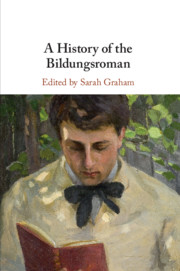Book contents
- A History of the Bildungsroman
- A History of the Bildungsroman
- Copyright page
- Contents
- Notes on Contributors
- Acknowledgements
- Introduction
- Chapter 1 The German Tradition of the Bildungsroman
- Chapter 2 The French Bildungsroman
- Chapter 3 The Bildungsroman and Nineteenth-Century British Fiction
- Chapter 4 The Bildungsroman in Imperial Russia and the Soviet Union
- Chapter 5 The American Bildungsroman
- Chapter 6 The Modernist Bildungsroman
- Chapter 7 Bildungsromane for Children and Young Adults
- Chapter 8 The Female Bildungsroman in the Twentieth Century
- Chapter 9 The Postcolonial Bildungsroman
- Chapter 10 Lesbian, Gay and Trans Bildungsromane
- Chapter 11 Bildungsromane and Graphic Narratives
- Notes
- Bibliography
- Index
Chapter 8 - The Female Bildungsroman in the Twentieth Century
Published online by Cambridge University Press: 14 December 2018
- A History of the Bildungsroman
- A History of the Bildungsroman
- Copyright page
- Contents
- Notes on Contributors
- Acknowledgements
- Introduction
- Chapter 1 The German Tradition of the Bildungsroman
- Chapter 2 The French Bildungsroman
- Chapter 3 The Bildungsroman and Nineteenth-Century British Fiction
- Chapter 4 The Bildungsroman in Imperial Russia and the Soviet Union
- Chapter 5 The American Bildungsroman
- Chapter 6 The Modernist Bildungsroman
- Chapter 7 Bildungsromane for Children and Young Adults
- Chapter 8 The Female Bildungsroman in the Twentieth Century
- Chapter 9 The Postcolonial Bildungsroman
- Chapter 10 Lesbian, Gay and Trans Bildungsromane
- Chapter 11 Bildungsromane and Graphic Narratives
- Notes
- Bibliography
- Index
Summary
- Type
- Chapter
- Information
- A History of the Bildungsroman , pp. 200 - 216Publisher: Cambridge University PressPrint publication year: 2019
- 2
- Cited by



